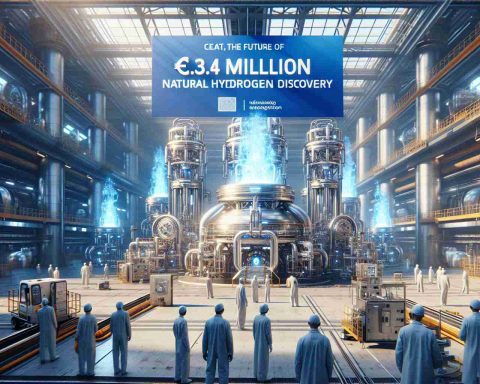- Hydrogen energy is revolutionizing green travel, providing vehicles that emit only water as exhaust.
- An effective alternative to fossil fuels, hydrogen powers cars, planes, and ships with zero emissions.
- Hydrogen-powered aircraft promise to significantly reduce the environmental impact of air travel.
- Major automotive brands are increasingly deploying hydrogen vehicles, offering quick refueling and sustainable travel.
- Global investments in hydrogen infrastructure aim to enhance production and refueling networks worldwide.
- Hydrogen energy represents a commitment to innovation, promising a sustainable future through renewable production methods.
- The shift to hydrogen reflects our capability to integrate progress with ecological responsibility.
Hydrogen energy, the once elusive dream of science fiction, is rapidly reshaping our approach to green travel. Imagine gliding down a highway serenely aboard a vehicle that doesn’t just conserve energy but produces only water as its exhaust. This isn’t the distant future; it’s unfolding now.
Elevating Efficiency
Hydrogen stands as a beacon of hope in the fight against climate change, offering a clean alternative to fossil fuels. Powerful and pure, hydrogen can be used in fuel cells to power cars, planes, and even massive cargo ships. Unlike traditional combustion engines that emit pollutants, hydrogen fuel cells work silently, producing nothing but electricity, heat, and water.
International airlines eye hydrogen-powered aircraft as the next big leap, promising to slice through the skies with minimal environmental impact. These innovations promise more than just a greener planet—they herald a new age of efficiency. Air travel, a notorious carbon emitter, could transform into an ally in sustainability.
Adventure Sustained by Science
In the automotive world, major brands unleash hydrogen-powered vehicles onto roads with increasing frequency. Picture sleek cars refueling in minutes, ready to whisper through landscapes as diverse as bustling city streets and quiet country roads. Each journey whispers a promise of sustainability backed by the relentless pursuit of innovation.
Moreover, countries around the globe are investing billions in hydrogen infrastructure. It’s a race with the highest of stakes, aiming to fortify refueling networks and enhance production methods. Nations harness technology to produce hydrogen from renewable sources using electrolysis, ensuring that the full cycle remains green and efficient.
A Takeaway for Travelers
At the heart of this transformation lies an empowering message: the choices we make today are shaping tomorrow. Embracing hydrogen energy is more than an environmental statement; it’s a testament to innovation and foresight. Each hydrogen-powered journey is a small yet significant step toward safeguarding our planet’s future.
As the horizon of sustainable travel widens, it’s clear that hydrogen energy isn’t just a part of what’s next—it’s here, charting a course toward a world where progress and ecology walk hand in hand. As we soar through this new era, let’s ensure our journey leaves behind not a trail of pollutants but a legacy of hope.
Revolutionizing Travel with Hydrogen Energy: What You Need to Know
Expanding Horizons with Hydrogen Energy
Hydrogen energy is gaining momentum as a cornerstone of the future green economy, particularly in the transportation sector. Beyond the well-documented benefits of hydrogen-powered vehicles, several other fascinating aspects deserve attention for those curious about the future of clean travel.
How Hydrogen Fuel Cells Work
Hydrogen fuel cells generate electricity through an electrochemical reaction between hydrogen and oxygen, eliminating most of the negative environmental impacts associated with traditional internal combustion engines. This process produces electricity, water vapor, and heat, making hydrogen an excellent alternative for zero-emission vehicles.
Real-World Use Cases
1. Automobiles: Toyota, Hyundai, and Honda have launched hydrogen fuel cell vehicles (FCVs) such as the Toyota Mirai and Hyundai Nexo, showcasing the potential for consumer adoption.
2. Public Transport: Numerous cities are incorporating hydrogen buses to reduce urban pollution levels.
3. Aviation: Companies like Airbus are actively developing hydrogen-powered aircraft, with a planned launch of zero-emission commercial flights by 2035.
4. Maritime: Hydrogen is also making waves in shipping, with prototypes for cargo ships that harness this clean energy.
Advantages and Current Challenges
– Pros: Hydrogen provides a higher energy content by weight than traditional fuels, fast refueling times comparable to gasoline, and the potential for significant carbon emission reductions.
– Cons: The current high cost of production, storage challenges, and the need for robust refueling infrastructure present significant hurdles that experts are diligently working to overcome.
Market Forecasts & Industry Trends
Analysts predict that the hydrogen market could exceed $200 billion by 2030 (source: McKinsey). The acceleration of green hydrogen initiatives—hydrogen produced from renewable energy sources—promises to enhance global energy security and substantially lower carbon footprints.
Prominent Questions and Answers
– Is Hydrogen Energy Safe?
Yes, when properly managed. Hydrogen is highly flammable, but technologies and safety protocols are being refined to mitigate risks, while its rapid dispersion reduces ignition risks.
– Where Can Hydrogen Fueling Stations Be Found?
Predominantly in regions like California, Japan, and parts of Europe, infrastructure expansion is ongoing, backed by governmental and industrial investment.
Comparison with Electric Vehicles
Whereas electric vehicles (EVs) rely on sizable battery packs and infrastructure like charging stations, hydrogen FCVs offer rapid refueling and potentially greater range. They complement rather than compete, as both technologies are integral to carbon-neutral ambitions.
Sustainability and Security Insights
The production of “green hydrogen” from electrolysis using renewables eliminates emissions entirely, ensuring sustainability. Continued advances in storage and distribution are essential for widespread adoption and leveraging hydrogen as a reliable clean energy source.
Actionable Tips
– Before investing in a hydrogen vehicle, check local refueling infrastructure.
– Support policies promoting renewable hydrogen production to boost broader adoption.
Hydrogen energy is paving the way for a sustainable future in transportation. Embrace the shift, and consider how you can contribute to and benefit from this clean energy revolution.
For more about hydrogen energy, explore resources at U.S. Department of Energy or Hydrogen Europe.















